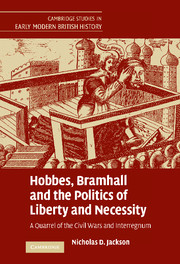 Hobbes, Bramhall and the Politics of Liberty and Necessity
Hobbes, Bramhall and the Politics of Liberty and Necessity Book contents
- Frontmatter
- Contents
- Acknowledgments
- List of abbreviations
- Note on dates and style
- Introduction
- 1 Bishop Bramhall, the ‘Great Arminian’, ‘Irish Canterbury’ and ‘Most Unsound Man in Ireland’, 1633–1641
- 2 Bishop Bramhall, the Earl of Newcastle, Thomas Hobbes and the First English Civil War
- 3 Hobbes's flight to France, De Cive and the beginning of the quarrel with Bramhall, summer 1645
- 4 An epistolary skirmish, 1645–1646: Bramhall's ‘Discourse’, Hobbes's ‘Treatise’ and Bramhall's ‘Vindication’
- 5 Bramhall and the royalist schemes of 1646–1650
- 6 Hobbes and Leviathan among the exiles, 1646–1651
- 7 The public quarrel: Hobbes, Of Liberty and Necessity, 1654, Bramhall, Defence of True Liberty, 1655 and Hobbes, Questions concerning Liberty, Necessity and Chance, 1656
- 8 Castigations of Hobbes's Animadversions and The Catching of Leviathan, 1657–1658: Hobbes as Leviathan of Leviathans
- 9 The Restoration and death of Bramhall and Hobbes's last word, 1668
- Conclusion
- Bibliography
- Index
- Cambridge Studies in Early Modern British History
4 - An epistolary skirmish, 1645–1646: Bramhall's ‘Discourse’, Hobbes's ‘Treatise’ and Bramhall's ‘Vindication’
Published online by Cambridge University Press: 17 July 2009
- Frontmatter
- Contents
- Acknowledgments
- List of abbreviations
- Note on dates and style
- Introduction
- 1 Bishop Bramhall, the ‘Great Arminian’, ‘Irish Canterbury’ and ‘Most Unsound Man in Ireland’, 1633–1641
- 2 Bishop Bramhall, the Earl of Newcastle, Thomas Hobbes and the First English Civil War
- 3 Hobbes's flight to France, De Cive and the beginning of the quarrel with Bramhall, summer 1645
- 4 An epistolary skirmish, 1645–1646: Bramhall's ‘Discourse’, Hobbes's ‘Treatise’ and Bramhall's ‘Vindication’
- 5 Bramhall and the royalist schemes of 1646–1650
- 6 Hobbes and Leviathan among the exiles, 1646–1651
- 7 The public quarrel: Hobbes, Of Liberty and Necessity, 1654, Bramhall, Defence of True Liberty, 1655 and Hobbes, Questions concerning Liberty, Necessity and Chance, 1656
- 8 Castigations of Hobbes's Animadversions and The Catching of Leviathan, 1657–1658: Hobbes as Leviathan of Leviathans
- 9 The Restoration and death of Bramhall and Hobbes's last word, 1668
- Conclusion
- Bibliography
- Index
- Cambridge Studies in Early Modern British History
Summary
Since nothing like a transcript of the live debate was ever made, it goes without saying that we will never know precisely how Hobbes and Bramhall argued their positions in Newcastle's chamber in Paris. But what took place shortly afterwards furnishes us with a good idea. Sometime before August 1645 Bramhall penned a position paper on free-will, in the form of a letter to Newcastle. From the dating of the oral debate established in the previous chapter we may suppose that Bramhall composed the paper in June or July of 1645. Bramhall's cover page reads: ‘To ye Right Honourable ye Marquess of Newcastle’. On a separate line below this is written ‘At Paris’. We can assume, then, that Bramhall was in Paris at the writing of it. We have seen that Bramhall probably spent most of 1645 in Brussels, Antwerp and elsewhere in the southern Netherlands. He must have been in Paris at least a few times, and composed the paper on one of these visits. In 1646, Bramhall clarified that he had written his 1645 paper merely to provide a fuller statement of the position he had argued against Hobbes in person: ‘Mine aim, in the first discourse, was only to press home those things in writing, which had been agitated between us by word of mouth.’ He entitled it ‘A Treatise of Liberty and Necessity upon Occasion of some Opinions of Thomas Hobbes about these’.
- Type
- Chapter
- Information
- Hobbes, Bramhall and the Politics of Liberty and NecessityA Quarrel of the Civil Wars and Interregnum, pp. 100 - 124Publisher: Cambridge University PressPrint publication year: 2007


